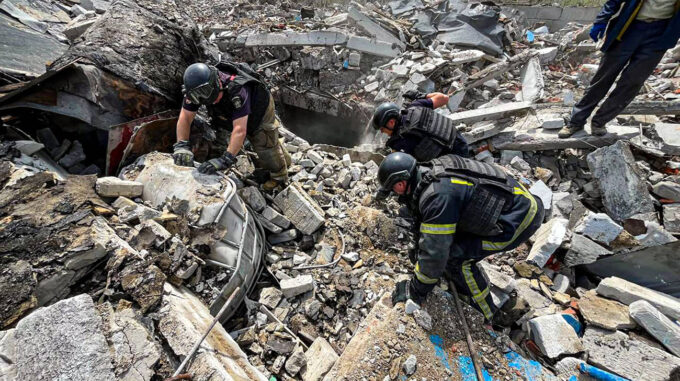On the evening of April 25, Russian occupiers once again attacked the peaceful city of Kupiansk in Kharkiv region, causing a tragedy that remains the subject of thorough investigation and discussion among local residents and human rights organizations

According to official information from the State Emergency Service, the missile strike resulted in casualties and infrastructure damage. However, most concern is raised by details of the events on May 2, when a significant blow by cluster munitions—so-called KAB—caused considerable damage to the Kupiansk municipal enterprise. According to firefighters and rescuers, during the rocket attack, the enterprise building was destroyed, and two workers were trapped under the debris. Thanks to the efforts of emergency responders, one of the victims’ bodies was recovered from under the rubble. At the same time, the second body remained beneath the wreckage, complicating rescue efforts. Operations had to be repeatedly halted because shelling from Russian forces continued, posing dangers to rescuers and hindering the rescue process. Only on May 8, through the tireless efforts and incredible bravery of the firefighters, was they able to extract the body of another fallen worker. These events serve as yet another testament to the ruthless destructive power of Russian aggression in the Kharkiv region and represent a personal tragedy for an entire team of workers who were at their posts during the attack. According to sources in Kharkiv region, the situation remained tense, with a high risk of new strikes. It is also emphasized that on the evening of May 2, Russian troops carried out continuous aerial bombardments of Kupiansk for over 20 minutes, further confirming the cynicism and deliberate targeting of civilians and critical infrastructure by the invaders. Local residents and volunteers are deeply affected by these events, as they involuntarily remember days and nights when enemy missiles destroyed their homes, leaving behind tragic stories and broken lives. The pace of destruction and the level of danger created by Russian aggression are high, and the issue of resolving the situation and protecting civilians remains at the forefront of public and political discourse across Ukraine. Today, it is crucial to preserve the memory of these tragic events and not forget those who have stood firm and continue fighting for their future, enduring losses and ruins. Ukrainian authorities, civil society, and international organizations continue working to draw global attention to the scale of destruction and casualties caused by Russian aggression, as well as to provide support to those affected. Meanwhile, mobilization—both for survival and defense—remains the best response to Russian attacks and one of the most important tasks for Ukrainian society during this difficult time.

